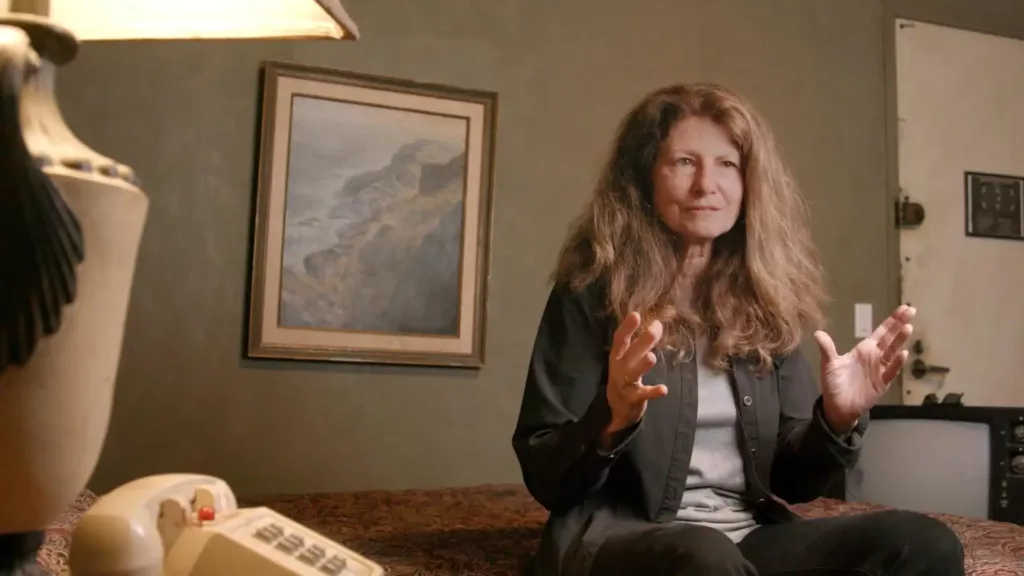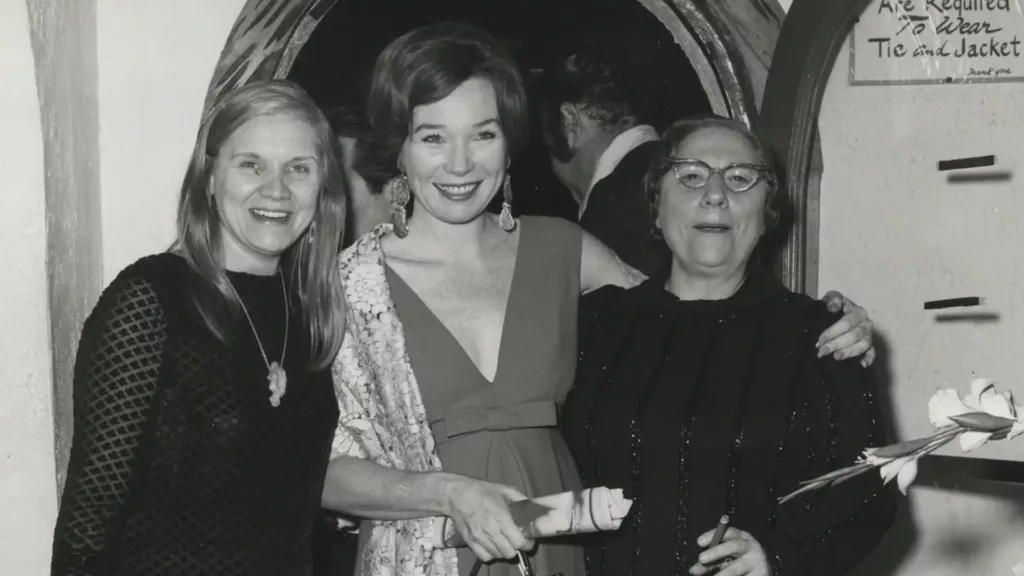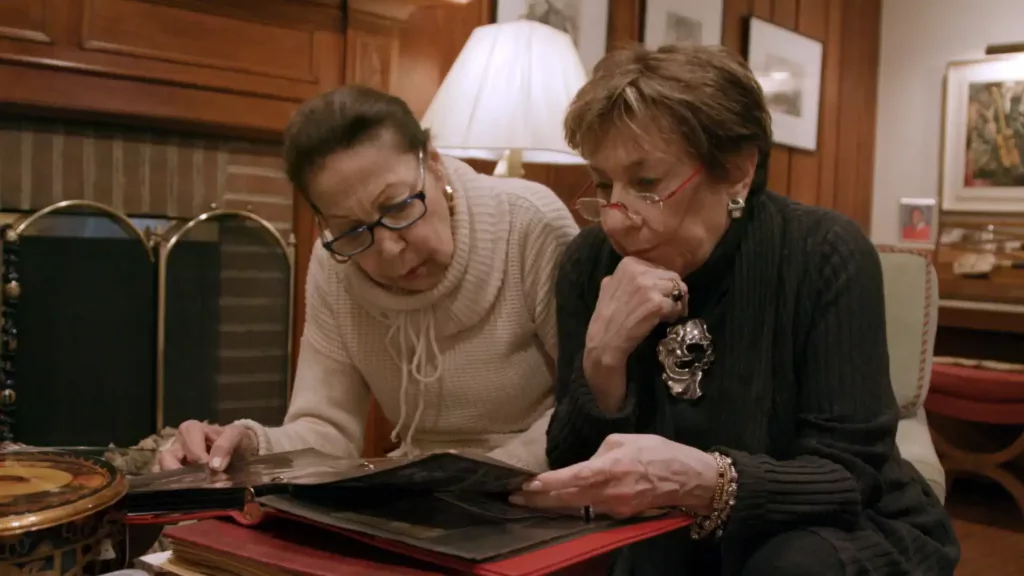Hidden within the seedy streets of New York’s Times Square lies the remarkable story of one woman’s rise from poverty to prominence. Queen of the Deuce takes viewers on a journey through the life and times of Chelly Wilson, the formidable matriarch who came to reign over the city’s 1960s porn scene. Born in Greece as Rachel Serrero, Chelly narrowly escaped the Holocaust to start anew in America with just five dollars in her pocket. Through grit and enterprise, she would build an empire that came to own hundreds of properties across Manhattan.
Director Valerie Kontakos weaves this unlikely tale through archival footage and interviews with Chelly’s family and friends. We learn of her early struggles selling nuts in New York before finding her fortune in the fledgling “adult” film industry. Chelly soon came to own several iconic theaters along 42nd Street, including the Adonis located above her lavish apartment. Those who knew her best reminisced about her bold personality, from her “mafia queen” demeanor to parties that mixed celebrities with criminals. But beyond business, Chelly offered support to her Greek community and helped pave the way for greater LGBTQ acceptance.
Much more than just a biography, Queen of the Deuce sheds light on important social changes of the 1960s and 1970s. It reveals how one determined woman not only survived immense hardships but revolutionized her new home in America. With its blend of interviews, animation, and archival media, the film brings this larger-than-life figure to vivid life. Kontakos ensures Chelly’s remarkable story of resilience will remain an inspiration for generations to come.
Chelly Wilson’s Unlikely Journey
Not many could have imagined the story of Chelly Wilson, starting with a young woman named Rachel Serrero in Greece. Born to a Jewish family in Thessaloniki, her early years were simple yet full of cultural richness. All that changed with the rise of fascism, as Rachel was forced into a loveless marriage to escape growing persecution. She had children and did her best to provide for them, but her heart was not in it.
As rumors of Nazi plans became reality, Rachel knew she had to flee for the lives of her family. Leaving two children behind was an agonizing decision, but giving them a chance at survival was all that mattered. In 1939, Rachel boarded the last ship departing Greece with only five American dollars to her name. She arrived in New York ready to take on any challenge to support her children from afar.
Nothing came easy for Rachel in those early years. She sold nuts on street corners, working grueling hours just to get by. Yet her determination seemed to grow with each struggle. Finally, Rachel landed a job at a small movie theater, hoping to connect with other Greeks in the city. But it was there that she noticed an opportunity for much bigger things.
As movies grew more risqué and audiences demanded more, Rachel saw a chance to use this new “adult” entertainment to her advantage. She took a risk that few women at the time ever would, buying up theaters along 42nd Street to screen these films. It was a bold move that would change everything. Through her theaters and later restaurants, Rachel finally had the means to bring her children to America and build a thriving new life—one she would come to rule as Chelly Wilson, the self-made Queen of the Deuce.
The Empire Expands
After making a name for herself in New York by distributing films from her native Greece, Chelly Wilson spotted a golden opportunity downtown. In the swinging 1960s, risqué movies were attracting bigger crowds than ever before. Never one to ignore a business chance, Chelly wasted no time acquiring a handful of theaters along notoriously seedy 42nd Street.
Soon, locals knew Chelly as the woman bringing them the newest “nudie” pictures and “roughie” flicks. While tame by today’s standards, titles like “Scarf of Mist, Thigh of Satin” pushed boundaries just enough to drive patrons wild. Always keen to maximize profits, Chelly branched out from merely screening films into producing her own lurid cash-grabbers too. Those in her orbit say she suffered no qualms about the industry and focused solely on giving audiences what they wanted.
As her empire along “The Deuce” grew, so too did Chelly’s lavish lifestyle. Perched above the appropriately named Adonis Theater was her sprawling apartment, where a constant stream of associates from all walks mingled among bags of office cash. Here, Chelly could keep a close eye on her growing fiefdom via countless surveillance feeds, presiding like the queen she had become.
By showing creativity and fearlessness where others saw only taboo, Chelly forged a porn powerhouse that would be the envy of many a mogul. Her success also let her put down roots in America, bringing family over from war-torn lands. Hard work and wild risks had paid off for the daughter of immigrants; now the wildest dreams were within grasp.
Chelly Wilson, The Lady of 42nd Street
What comes through clearly in “Queen of the Deuce” is just how dynamic and charismatic Chelly Wilson truly was. Those who knew her recall with fondness the force of personality that commanded any room she entered. Sitting court in her lavish midtown apartment, anyone was welcome as long as they respected Chelly’s authority. Business rivals and mobsters mingled comfortably among lovers of all kinds.
Nestled above the Eros Theater, her spacious rooms offered the perfect vantage point. On busy evenings, Chelly could keep a watchful eye on the crowds below through countless surveillance feeds. But she never seemed to worry over such things, instead pouring drinks and lighting up as wild stories and laughter filled the air. No matter one’s origins or desires, all found a convivial spirit willing to buy another round.
This was, after all, the freewheeling 1970s—a prime era for self-expression. And none embraced the times more than the vivacious lady of 42nd Street. Chelly understood intuitively that people simply want places to explore their most authentic selves, free from scorn or shame. So in her theaters, all were welcome to appreciate the artists on screen, as she appreciated them in her own unconventional way.
Beyond business, Chelly made it her mission to uplift local Greek and LGBTQ communities still facing uncertainty. Never one to mince words, she aggressively advocated for others in a way that commanded respect. Through it all, a survivor’s empathy for those needing a safe harbor to call their own. In Chelly Wilson, countless people found a role model daring to blaze her own trail, unapologetic in living life on her own terms.
Personal Recollections of a Complex Woman
Through interviews with her loved ones, “Queen of the Deuce” peels back the layers on Chelly Wilson to reveal the fascinatingly complex woman beneath. Speakers candidly share memories that help us understand this larger-than-life figure on a deeper, more human level.
We hear from her daughters and grandchildren, some of whom were surprised to learn key aspects of Chelly’s background. Her willingness to celebrate both Hanukkah and Christmas in her adult living room reflects her attitude of inclusiveness. She embraced all without concern for social norms.
Accounts of rowdy evenings in her lavish apartment conjure the magnetic energy Chelly exuded. From mobsters to movie stars, anyone was welcome at her table. Though fearsome in business, few knew her gentler side like family did. Her generosity extended well beyond money; her boisterous spirit brought light amid darkness.
Interviewees fondly recall Chelly’s sharp wit too. Despite the ever-shifting figures who populated her life, bonds with her “real family” endured most. Unconditional love prevailed where judgment of others often arose. Though her more scandalous dealings left grandchildren perplexed as youths, respect for their strident matriarch runs deep.
By sharing these glimpses into Chelly’s warmth and complexity as a woman, not just a mogul, “Queen of the Deuce” leaves us with a far richer sense of her character. Even decades after her passing in 1994, her vibrant presence remains alive through the affectionate recollections of those who knew her best.
The Transformation of Times Square
The heyday of 42nd Street wouldn’t last forever. As more conservative forces began targeting “smut peddlers,” publishers faced rising pressure. Arrests grew over supposed obscenity, shuttering venues Chelly depended on.
Meanwhile, escalating violence made the neighborhood disturbingly lawless by the 1980s. Though not solely to blame, the seedy scenes understandably harmed the area’s reputation. Mayor Giuliani opted to “sanitize” Times Square for a rebranded Disney image.
His controversial redevelopment cleanup got underway as Chelly entered her later years. Where sex shops and peep shows once stood, bright billboards and family-focused retail took over. Gentrification continued erasing what trace remained of Chelly’s empire.
Although change was arguably necessary, one can’t help feeling that something profound was lost. 42nd Street represented a pivotal period of relaxing cultural boundaries. For all its faults, the district sheltered sexual exploration in a less tolerant time.
Chelly thrived there by meeting real consumer needs. She didn’t judge different lifestyles; she only understood giving audiences what they wanted. While her business faced challenges, other visionaries gained from the new freedoms she helped forge.
So while redevelopment remade Times Square beyond recognition, Chelly’s key role deserves acknowledgement. In giving desires an outlet, she helped propel social changes still unfolding today. We ought to appreciate how her work advanced acceptance, even if it vanished all too quickly.
Chelly Wilson’s Enduring Legacy
Through it all, Chelly exhibited tremendous grit and enterprise. After escaping Nazi atrocities, she built herself up from nothing in New York. Wilson had an eye for untapped markets, realizing potential in the Greek community and the burgeoning sexual revolution.
By normalizing untapped desires, she advanced social change. Chelly sheltered exploration for those living in fear. Her diverse clientele found community in Times Square without judgment. Though controversial, she empowered self-expression and challenged outdated taboos.
Her family and those who knew her painted a vivid portrait. Archival recordings bring Chelly’s vibrant personality to life, despite passing decades. Through her fond anecdotes, we see her big heart and willingness to uplift others. Wilson favored living boldly in the moment over future dreams.
Today, her former properties stand as relics of an era forced to modernize. But Chelly’s story, shared so lovingly, ensures her pioneer spirit lives on. By giving voices a stage, she upgraded social dialogues still unfolding. Though Times Square changed beyond recognition, Chelly’s lasting impact deserves remembrance. Her legacy of resilience inspires her to face life’s tests with the same grit and gusto.
The Review
Queen of the Deuce
In summary, Queen of the Deuce presents a riveting true tale of entrepreneurship, family, and social progress. Through intimate interviews and archival materials, the film brings Chelly Wilson's vibrant personality to life. She exemplified resilience in the face of adversity, empowering self-expression through her work. Director Kontakos skillfully balances history and heart to immortalize Wilson's pioneering contributions.
PROS
- The fascinating true story of an ambitious immigrant woman
- Intimate family interviews that humanize the subject
- Insightful historical context on the porn industry's evolution
- Archival footage and animation bring Wilson's era to life
- Respectfully, it shows Wilson as a trailblazer who advanced social changes
CONS
- She focuses more on Wilson's personal life than her business acumen
- Provides little depth on the film and cinematic talents involved
- Reviewers wished for more coverage of her Times Square properties
- Lacks perspective from those in the broader community she uplifted






















































Discussion about this post